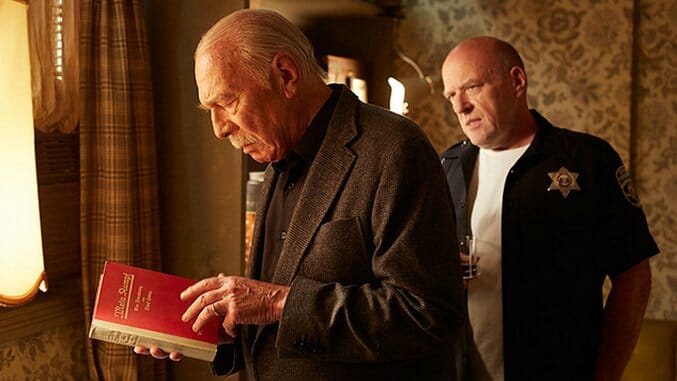
In Hebrew, the name Zev means “wolf,” but the protagonist of Atom Egoyan’s new film, Remember, is more like a lamb. Zev Gutman strikes no predatory impressions when we first meet him lying prone in bed, calling out his dead wife’s name in a state of bestirred delusion. He cuts a feeble figure: He does not wear the countenance of a ruthless killer, and yet killing has become the sole purpose of what remains of his life. Remember is about the Holocaust, but at its heart it is a revenge film, the rare sort that combines the pursuit of such with recollections of the Shoah; think Flame & Citron or Inglourious Basterds, but modern-set and, until the film’s finale, less fantastical.
Zev (Christopher Plummer) is a chess piece on a board set by his friend, Max (Martin Landau). Both men survived the horrors of Auschwitz, and in the present tense they live in the same nursing home, where Max has recruited Zev to act as his agent in a mission of vengeance. Max has discovered that the man responsible for killing his and Zev’s families in the camp resides in North America and under an assumed name: Rudy Kurlander—though by a terrible stroke of fortune there happen to be four men on the continent bearing that deceptive appellation. So Max, stuck in a wheelchair and hooked up to an oxygen tank, sends Zev out into the world to figure out which Rudy Kurlander is in fact their erstwhile tormentor and summarily execute him. It’s the best bad idea Max can possibly concoct given Zev’s mental fragility.
Remember sticks with Zev as he makes his way through the States and across the border into Canada in search of his quarry. It’s a fine enough premise for a movie; Zev suffers from dementia, and repeatedly throughout his journey has to stop and regain his bearings. He has a totem of sorts for that purpose, a letter from Max that he refers to when he finds himself lost in his own mind. If you need more reference points than Madsen or Tarantino, then regard Remember as Egoyan’s take on Memento by way of Hitchcock, who spent his career musing on matters of identity. We know who Zev is, though he forgets himself so often that we start to lose track of his selfhood too. Is this a man out to avenge his dead kin, or a doddering fogey who should have never set foot outside his assisted living facility?
Egoyan mines empathy from the cloud of confusion in which Zev spends much of his time, and tension from his hero’s uncertainty. Each time Zev confronts a Rudy Kurlander, he is confronting the truth and solving an equation where a wrong answer means the death of an innocent. Should that kind of power and responsibility be placed in the hands of a person who can’t retain the details of his spouse’s recent passing? Probably not. But if Zev is ill-equipped to face his one-time tormentor, he nonetheless deserves the chance to do so, even if he isn’t the kind of person you want carrying a Glock in public. (Egoyan milks that detail for commentary on our country’s relationship with firearms. Zev is stopped by a security guard while outlet shopping, and the guard searches his bags only to find that Zev is packing heat. Instead of doing something about it, the guard waxes nostalgic. “Reminds me of my first gun.”)
The contrast between Zev’s infirmity and the bloody nature of his purpose makes Remember an appealing morality play. Can we forgive the grave injustices done against us? Is it possible to let the past be the past? (We get a roundly bleak reply to that query when Dean Norris arrives to play the Nazi son of one of Zev’s potential targets. It is the film’s best and most dread-inducing sequence.) As Egoyan poses these questions, we’re rapt by the work of Plummer, one of the movies’ greatest actors and a sight to behold as Zev. There is a thin line separating tasteless portraits of mental illness from affectingly human ones, and Plummer never crosses it. He’s a marvel, put simply, conveying Zev’s anguish—over his history, over the loss of his wife, over the task he has been charged with—in nuanced flourishes: a nervous glance here, a tremble of the chin there, a furrowing of the brow there. (His accent is also splendid.)
But he’s also wasted, as are the first two thirds of the film, by a third-act turn that’s so maddeningly stupid as to make the combined twists of M. Night Shyamalan’s filmography look well-considered. Writing about Remember demands writing about the direction it takes once Plummer reaches the final Rudy (played by the great Jürgen Prochnow). Suffice it to say that if you happen to nod off about an hour and ten minutes into Remember, it becomes a much better movie than if you decide to see it through to the end. Egoyan has, according to critics, been on a backslide of late thanks to ill-received efforts like Chloe, The Captive and Devil’s Knot. In an alternate universe, Remember is the film that helps bring him back to respectability. In our universe, it’s the film that almost gets him there save for an embarrassingly tone-deaf climax.
Director: Atom Egoyan
Writer: Benjamin August
Starring: Christopher Plummer, Martin Landau, Dean Norris, Jürgen Prochnow, Bruno Ganz
Release Date: February 12, 2016
Boston-based critic Andy Crump has been writing online about film since 2009, and has contributed to Paste Magazine since 2013. He also writes for Screen Rant, Movie Mezzanine and Birth.Movies.Death. You can follow him on Twitter. He is composed of roughly 65% craft beer.